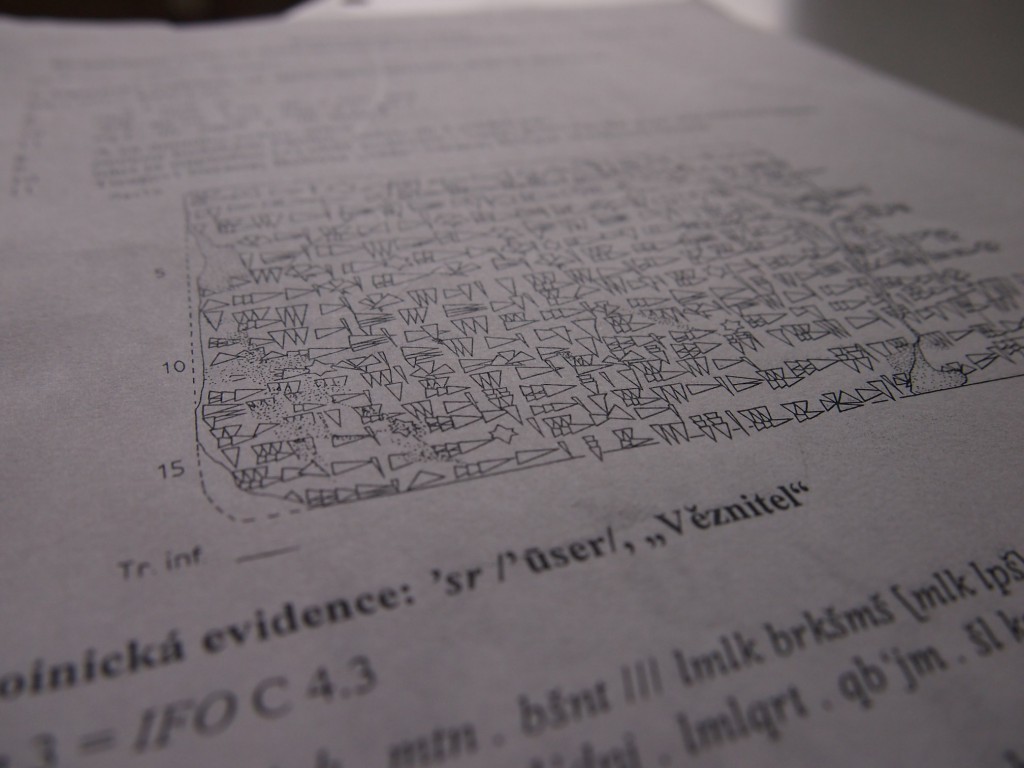
As some of you remember, I study in the specialty "Cuneiform", very exotic :)
Recently I wrote about what subjects I studied at the very beginning of the academic year. Today I'll tell you how the 1st half of the academic year went and what I'm studying now.
End of 1st semester, exams
The 1st semester ended in early January, compared to studying in Russia, we studied extremely little (remember, studies started October 1).
Then came the so-called "zkouškové období" (Eng: exam period). Exams in Czech Republic are taken a bit differently, and I'll devote a separate note to this.
Essentially, I was bored for a whole month and a half (self-preparation is harder for me than studying at university), and now, exams are passed, the second semester has begun.
Subject enrollment, schedule
A Czech student's semester begins with enrolling in subjects in the information system. This time I was quicker, sat at the computer on time, so I enrolled in everything I wanted (well, almost).
In the second semester the schedule turned out extremely convenient:

The schedule in the system differed slightly from reality. So, the class written here first on Thursday actually took place on Wednesday, and after it came another one, but for some reason it wasn't in the schedule at all.
So, with the naked eye you can notice that I freed up 2.5 days a week (on Monday I didn't go to lecture, 1st half of Thursday was free) and I decided to look for work. In principle, I managed to do this easily, but it's worth writing about this in more detail later.
I must note - in Czech Republic masters can practically fully support themselves and at the same time study (of course, everything depends on the program's complexity, but most work).
Subjects of 2nd semester
I'll move on to describing the subjects I enrolled in.
Poetika poezie, prózy a dramatu II
Continuation of the subject from 1st year, nothing changed - we read texts, discuss them in seminars. At the end of the semester you can either take an oral exam or write a 10-page essay. I chose the latter.
Písemnictví starého Předního východu doby železné
Also continuation of the subject, about ancient languages. Emphasis is placed specifically on writing.
Also continuation of the subject. There we learn Akkadian language (ancestor of Arabic, Hebrew). Topics have already become quite complex, I'm terribly confused in them.
Continuation of the subject, the most ancient Indo-European language. The teacher changed, now we slowly read texts and very deeply analyze each word.
Semitská srovnávací jazykověda (úvod)
New subject - introduction to Semitic comparative linguistics. We study the very basics - parts of speech, grammatical categories. In general, we look at language already from a more theoretical point of view.
Latina I. Kurz pro začátečníky
I enrolled in Latin language - studied it already at RUDN, however, forgot everything. The approach is a bit different, in Czech Republic emphasis is on memorizing words, in Russia there was emphasis on grammar. Very useful subject. By the way, in this subject there are very few masters. Accordingly, I see, so to speak, the young Czech generation :) Can't say everyone is hardworking, but there are no complete stragglers.
Also a new subject - sociolinguistics. Comparatively young branch of linguistics, they told us about basic concepts. It was exactly there I learned about the Czech language atlas. Interestingly, the subject ran only the first half of the semester, i.e. lectures ended approximately in early April.
Also a new subject. Initially we had no place to enroll in it. But, as I indicated earlier, sociolinguistics ended in the 1st half of the semester. So as not to waste time and credits, we agreed with the teacher that the 1st half of the semester we'll study at home, then - we'll go to the freed time.
Onomastics - the science of names. Names are an excellent source for studying ancient languages. It often happens that in this or that language besides names nothing is preserved, however, there's nothing terrible in this - names carried meaning and often consisted of whole sentences. We even got to studying biblical names.
Separately from everything stands this subject. As you see, it's not in the schedule. This is all because a professor will come to us from Germany for a week, and the whole week will be only this subject (at the very end of the semester).
This is Sumerian language. We don't have many specialists of this profile at our department, so lectures should be interesting. I plan to write about this too.
Well - summing up - the semester turned out more loaded, but the schedule - more successful. We're slowly deepening our knowledge, there's little new.